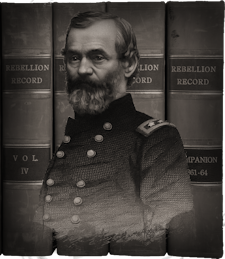February 10.—The expedition which had been sent up the Tennessee River, after the capture of Fort Henry, returned to the railroad crossing, twenty-five miles above the fort.
The expedition, embracing the gunboats Conestoga, Taylor and Lexington, under Lieutenant Phelps, left Fort Henry on the sixth inst., and on the same day it destroyed a quantity of camp equipage, which had been abandoned by the rebels.
On the following day, (the seventh,) several rebel transport steamers were pursued, and two of them, laden with military stores, were abandoned and burned by their crews.
On the same night, at Cerro Gordo, Tenn., the steamboat Eastport, in process of alteration into an iron-plated gunboat, and large quantities of timber and lumber, were seized, and the Taylor was left behind to protect them, until the return of the expedition.
On the morning of the eighth, at Chickasaw, Miss., two other steamboats — the Sallie Wood and Muscle—were seized; and on the same day, at Florence, Ala., three other steamboats were burned, and great quantities of supplies for the rebel army were taken and destroyed.
The expedition proceeded no farther up the river; but a deputation of citizens waited on Lieutenant Phelps and requested him to respect their persons and the property of the citizens, and the railroad bridge, which connects Florence with the railroad on the south bank of the river, all of which was complied with.
Returning to Cerro Gordo, the prize steamboats Eastport, Sallie Wood and Muscle, were laden with upward of a quarter of a million of feet of valuable lumber and ship-timber, which, with all the iron, machinery, spikes, plating, nails, etc., belonging to the rebel gunboats, was carried down to the Union lines.
A rebel encampment at Savannah, Tenn., was also broken up, and considerable quantities of arms, clothing, shoes, provisions, etc., were secured or destroyed.
The expedition met with the most gratifying proofs of loyalty everywhere on the Tennessee River; twenty-five Tennesseans were enlisted at Cerro Gordo, by Lieutenant Gwin of the Taylor, and the most perfect success crowned the arduous labors of the party.—(Doc. 32.)
—Ethan A. Hitchcock was confirmed as Major General of Volunteers in the Army of the United States.
— General Hunter proclaimed martial law throughout the State of Kansas, and declared the crime of jayhawking should be put down with a strong hand and summary process.
—Commander Rowan, with fourteen vessels, left Roanoke Island yesterday afternoon, and at six minutes past nine, this morning, when off Cobb’s Point, N. C, he attacked the rebels’ squadron, which had fled from Roanoke, under Commander Lynch, and two batteries, mounting five guns. Within twenty minutes a schooner belonging to the enemy, struck her colors, and was burned by her crew; and immediately afterward, the crews of the Powhatan, Fanny, Sea Bird and Forrest, ran them ashore and set fire to them, while these of the Raleigh and Beaufort ran their vessels into the Canal and escaped; the Ellis was captured, and brought away by the Union forces.
The battery on Cobb’s Point was also abandoned by the enemy, and occupied by acting Master’s Mate Raymond during the morning; and before ten o’clock Elizabeth City also surrendered. —(Doc. 33.)



